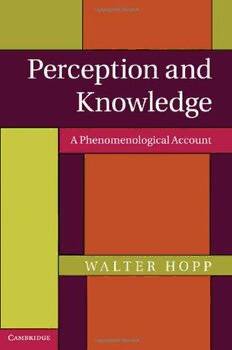
Perception and Knowledge: A Phenomenological Account PDF
260 Pages·2011·0.999 MB·English
Most books are stored in the elastic cloud where traffic is expensive. For this reason, we have a limit on daily download.
Preview Perception and Knowledge: A Phenomenological Account
Description:
This book offers a provocative, clear and rigorously argued account of the nature of perception and its role in the production of knowledge. Walter Hopp argues that perceptual experiences do not have conceptual content, and that what makes them play a distinctive epistemic role is not the features which they share with beliefs, but something that in fact sets them radically apart. He explains that the reason-giving relation between experiences and beliefs is what Edmund Husserl called 'fulfilment' - in which we find something to be as we think it to be. His book covers a wide range of central topics in contemporary philosophy of mind, epistemology and traditional phenomenology. It is essential reading for contemporary analytic philosophers of mind and phenomenologists alike.
See more
The list of books you might like
Most books are stored in the elastic cloud where traffic is expensive. For this reason, we have a limit on daily download.
